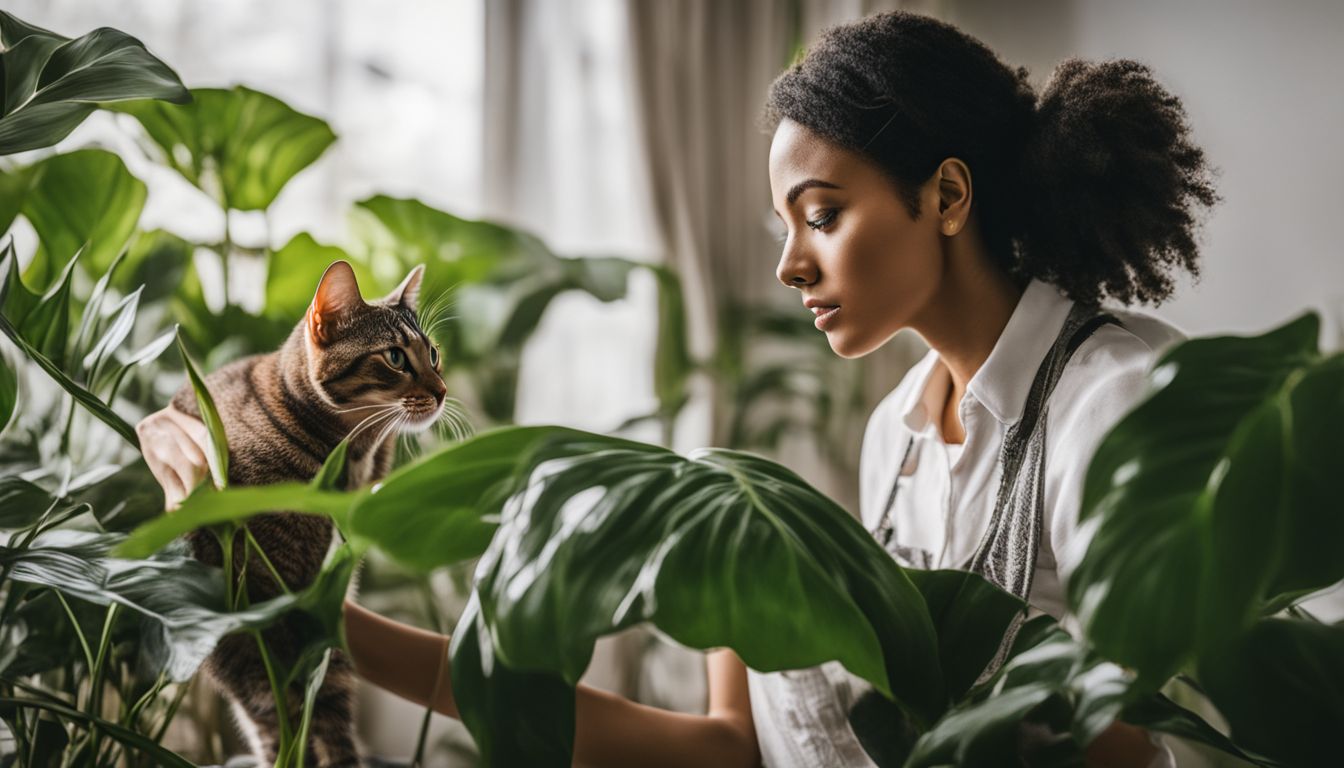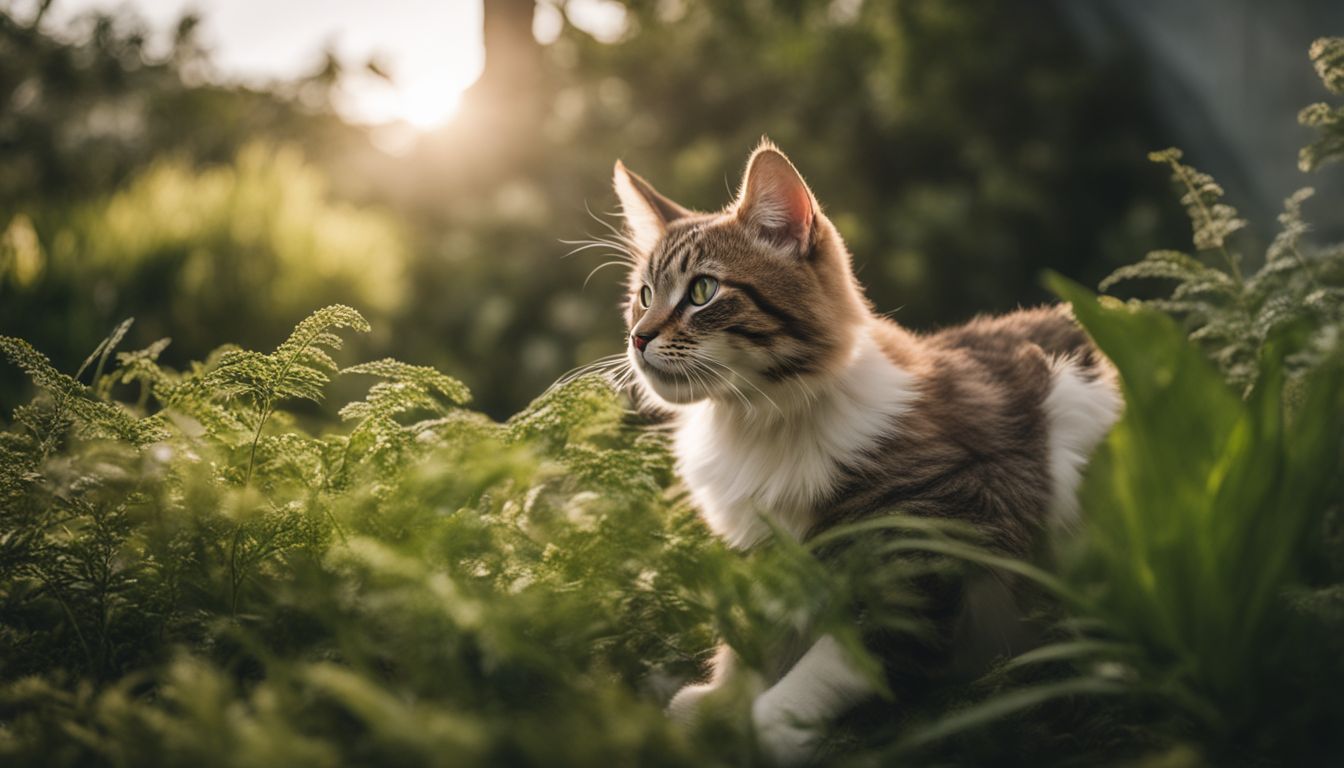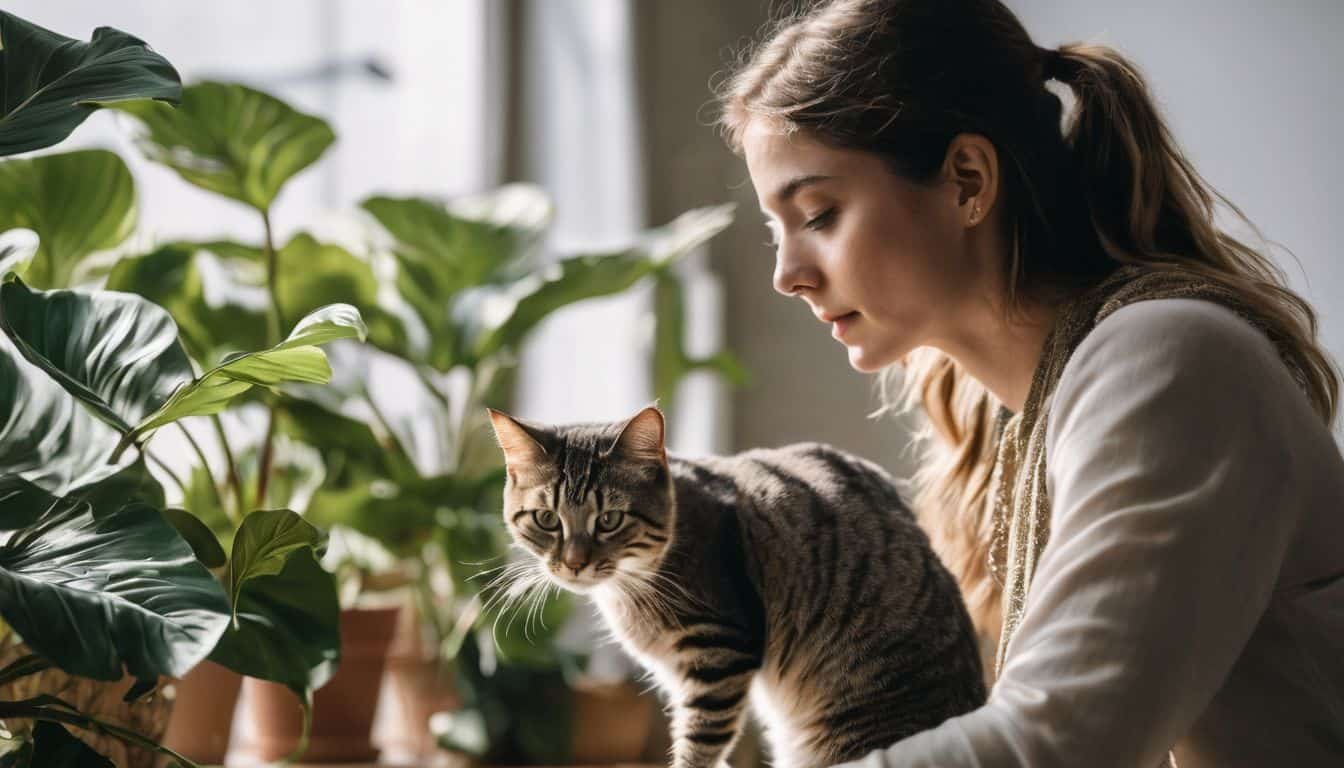Philodendron Birkin is a plant with green and white leaves that many people like to grow in their homes. But there’s something important cat owners need to know: Philodendron Birkin Toxic to Cats. It’s can make cats sick because it has sharp crystals inside called calcium oxalate.
If a cat eats any part of the Philodendron Birkin, it could feel really bad, hurt its mouth, throw up, or even get more serious health problems.
This kind of Philodendron comes from Colombia and belongs to the Philodendron erubescens family. Plants like these are pretty but less dangerous than some other plants such as lilies or those used for making drugs.
However, if you have a cat that munches on your indoor jungle, you should think about picking different plants that won’t hurt them.
Keeping your pet safe is key. This means putting harmful plants out of reach or choosing ones that are okay for cats to be around. Knowing what to do if your fluffy friend does eat some Philodendron Birkin can save their life — acting fast and getting help from a vet is crucial.
Understanding which kinds of Philodendrons are in your home is just as important since they all have this toxic stuff inside them. Ready? Let’s learn how to keep our furry friends safe around these tricky plants!
Key Takeaways
- Philodendron Birkin has calcium oxalate crystals that can hurt cats if they eat the plant, causing mouth pain, throwing up, and more serious health issues.
- Keep these plants out of cat’s reach or pick safer ones like spider plants and cat grass for a pet-friendly home.
- If your cat eats part of a Philodendron Birkin, clean their mouth and call the vet quickly for help.
The Toxic Nature of Philodendron Birkin to Cats

Philodendron Birkin, a popular houseplant known for its vibrant foliage, belongs to the araceae family and contains calcium oxalate crystals. When ingested by cats, these crystals can cause oral irritation, gastrointestinal upset, trouble swallowing, respiratory problems, and kidney failure.
It’s crucial for cat owners to recognize the toxic nature of philodendron birkin and take preventive measures to keep their pets safe from potential poisoning.
Symptoms of Philodendron Poisoning in Felines
I know how much we love our furry friends and how we enjoy having beautiful plants like Philodendron Birkin in our homes. It’s important to be aware that these lovely plants can be dangerous to cats.
- Cats may start vomiting after they chew on a Philodendron plant. This is often one of the first signs.
- Your cat might show signs of oral irritation, like drooling, because the crystals in the plant hurt their mouth.
- If your cat seems restless or keeps pawing at its face, it could mean the plant has caused a burning sensation inside its mouth.
- In serious cases, your pet might not want to eat, which leads to a lack of appetite and can harm their health if not treated.
- Watch for signs of overall weakness or tiredness in your cat. This lethargy is another clue that something isn’t right.
- Plants like Philodendron contain calcium oxalate crystals that can make cats very sick with dehydration and stomach problems.
- Sometimes, when poisoning gets really bad, it can lead to kidney failure or liver problems.
Preventive Measures to Protect Cats from Philodendron Birkin

Cat owners should consider placing their Philodendron Birkin plants in areas that are inaccessible to their feline companions, and also explore safe alternatives such as spider plants or cat grass.
To learn more about how to keep your cats safe from this toxic plant, continue reading the full blog post.
Safe Alternatives to Philodendron for Cat Owners
I know my fellow plant lovers also adore their furry friends. If you have a cat, stay away from philodendrons to keep them safe.
- Spider Plant: Cats often like to nibble on this plant. It’s safe and can even handle a bit of rough play.
- Boston Fern: These lush ferns add greenery without any risk to your cat.
- Bamboo Palm: A tropical touch that’s perfect for homes with curious cats.
- Areca Palm: Like the bamboo palm, this is another safe option that gives your space a tropical vibe.
- Money Tree: Not only do these look cool, but they also won’t harm your kitty if they take a bite.
- Cat Grass: You can buy or grow it for your cat to munch on. It’s good for them and helps with digestion.
- Swedish Ivy: This plant is not really ivy, but it’s completely safe for cats and looks pretty too.
What to Do If Your Cat Ingests Philodendron Birkin
If your cat ingests Philodendron Birkin, it’s crucial to act quickly. Remove any remaining plant material from your cat’s mouth and contact a veterinarian immediately for guidance on next steps and potential treatment options.
Steps for Immediate Care and Veterinary Intervention
I love plants and I know a lot of you do too. But our green friends might not be safe for every member of the household, especially cats.
- Steps for Immediate Care and Veterinary Intervention
- Remove any plant pieces from your cat’s mouth.
- Cleanse the mouth area with water gently to reduce irritation.
- Don’t wait; call the vet or Pet Poison Helpline right away.
- Keep an eye on your cat for signs like coughing or choking.
- Bring a piece of the plant to the vet for easy identification.
- Your vet might give intravenous fluids to help with dehydration.
- They may also treat the irritation caused by calcium oxalate crystals.
- Listen carefully to your vet’s advice on home care after treatment.
Exploring Varieties: Philodendron Birkin Pink and Its Toxicity
Philodendron Birkin Pink, a beautiful variant of the Philodendron plant family, carries the same toxic threat to cats as its green counterparts. Its vibrant pink and white leaves may be appealing, but pet owners should be aware that all parts of this plant contain insoluble calcium oxalates.
These harmful substances can cause moderate toxicity in cats if ingested. So, it’s crucial for cat owners to understand that while Philodendron Birkin Pink adds aesthetic value to indoor spaces, it poses a potential danger to their feline companions.
Pink Princess and Heartleaf are other variations of Philodendron plants known for their toxic nature towards cats. Despite their striking appearance, these plants can lead to severe health issues in pets if consumed.
Therefore, cat owners must exercise caution and consider safe alternative plants when aiming to enhance home decor without risking their pet’s well-being.
Conclusion
In conclusion, understanding the dangers of Philodendron Birkin to cats is crucial for pet safety. By being aware of the toxic nature and symptoms of ingestion, cat owners can take practical preventive measures such as keeping the plant out of reach or opting for safe alternatives.
Prompt action and veterinary intervention are vital if a cat ingests Philodendron Birkin to mitigate potential harm. Emphasizing caution around this common houseplant can lead to a significant reduction in pet poisonings and ensure a safer environment for our feline companions.
Remember, being informed about toxic plants like Philodendron Birkin is an essential step towards providing a secure and healthy space for our pets.
Discover the unique charm and potential risks of the Philodendron Birkin Pink as we delve into its characteristics and safety considerations for your feline friends.
FAQs
1. Is the Philodendron Birkin plant poisonous to cats?
Yes, the Philodendron Birkin is toxic to cats. If a cat eats it, they might get very sick.
2. What happens if my cat chews on a Philodendron Birkin?
If your cat chews on this plant, they can feel pain in their mouth and have trouble swallowing because of sharp crystals called calcium oxalate.
3. Are there other houseplants that are also bad for cats like the Philodendron Birkin?
Yes, several plants like peace lilies, Swiss cheese plants, and dieffenbachia are harmful to cats too.
4. What should I do if my cat gets poisoned by a toxic plant?
Quickly take your pet to get veterinary care if you think it ate a toxic plant.
5. Can any home remedies help if my cat eats part of a Philodendron Birkin?
No! Don’t try home remedies like chicken broth; always see a vet for the right treatment if your cat is poisoned.




